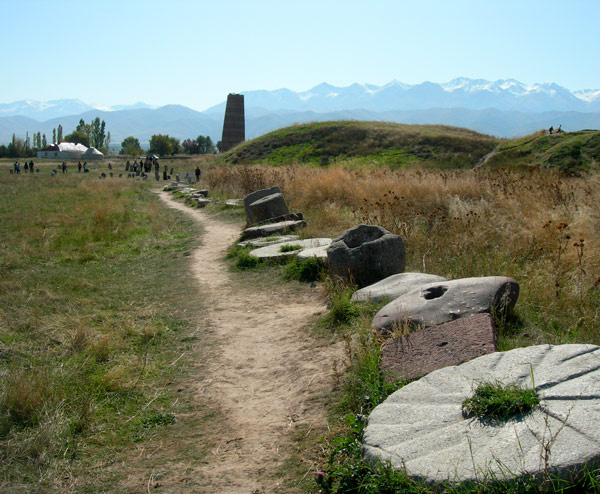A lot is said about the lands of Outer Mongolia and Outer Manchuria which were once (at least nominally) part of the Qing Dynasty but later lost to Russia and Mongolia. What isn't discussed in great detail, aside from circles of ultra-nationalist Chinese, is the concept of "外西北" (Wai Xibei), the Outer Northwest. These were lands that fell under the territory of the Dzungar Mongols, which were later subjected to the Qing and finally to Russia following a series of Sino-Russian treaties.
If, by chance, somehow these lands ended up part of China until the modern day, it would drastically change the geopolitical situation of the region. The lands within the Outer Northwest include the modern city of Almaty, which is Kazakhstan's largest city and former capital. It also contains the majority of modern Kyrgyzstan, including the capital of Bishkek. Having travelled through both of these cities, the very Soviet Russian feel preserved there makes it difficult to imagine them as Chinese cities in an alternate world. Of course, neither of these existed as any more than small forts before Russian rule, but geographic determinism would suggest that cities would eventually be founded in their general locations. A large swath of eastern Tajikistan, containing the Pamir mountains, is also included in these claims.
How would these areas look today? Would they be organized as part of a greater Xinjiang, or would Xinjiang later be divided into two provinces (based on Dzungaria and Kashgaria)? Would the Kazakhs and Kyrgyz, still nomadic at this time, largely stay on the Russian side, or would the bulk of them still migrate into this area, then bulking up China's native Kazakh and Kyrgyz populations? What would become of the remnant Kazakhstan, which would still encompass a huge landmass but lack its most populous city and most important commercial center? Which Kazakh city would be the most important in the 20th Century (keeping in mind that the present capital of Astana is still fairly new)? These regions are also full of valuable fuel and mineral deposits that have China actively courting the governments of Kazakhstan, Kyrgyzstan, and Tajikistan to get a share.

A map in Chinese depicting the "外西北" claimed to have been lost to Russia by the Qing.

The archaeological site of Suyab, Kyrgyzstan, believed to be the ancient town of Suiye recorded by Chinese records. Once a stop on the Silk Road and an entry way of Mahayana Buddhism into China during the pre-Islamic period, Suiye is famous for being the purported birthplace of acclaimed Tang Dynasty poet Li Bai, as well as a place of pilgrimage by the famous Chinese monk Xuanzang on his journey to India.
https://s.yimg.com/fz/api/res/1.2/3...u/img4/v/i/vikantipod/burana-general-view.jpg

The largest and oldest mosque of Zharkent, Kazakhstan, in the city nearest to the Chinese border. It was built by a Dungan (Hui) Muslim architect from China in the late 19th Century, notably during the period of Tsarist Russian sovereignty. It is said that the architect's hands were later cut off by Qing authorities after he returned to his home country. The mosque is still used for worship by local Kazakhstani Muslims to this day and still reflects its obvious Chinese heritage, though Russian and Kazakh influences have pervaded due to numerous restorations over time.

A mosque in Karakol, Kyrgyzstan, also built by Dungan architects between 1907 and 1910. It has also become progressively more Soviet-Russian in style in successive restorations, to a greater degree than the older one in Zharkent.

Dungan (Hui) women in Sortobe, Kazakhstan. Many Hui people left Gansu, Shaanxi, and Xinjiang during the 19th Century, and migrated to the border area of modern Kazakhstan and Kyrgyzstan where they live to this day. They maintain distinct dialects of Shaanxi and Gansu Mandarin, which they call "hui zu hua," differing slightly from village to village depending on the origin of its founding population and which side of the border they live on. As their ancestors were mostly illiterate in Chinese characters, they originally used a system of written Arabic adapted from their Koranic studies to write their language, but later adapted the Cyrillic alphabet at the behest of Soviet authorities, who banned all Arabic scripts. As the result of their isolation and use of Cyrillic alphabet, their dialects are quite distinct from other forms of Chinese, having adopted many Russian and Turkic words and having maintained some archaic Chinese terms that fell out of use after the Qing dynasty.
If, by chance, somehow these lands ended up part of China until the modern day, it would drastically change the geopolitical situation of the region. The lands within the Outer Northwest include the modern city of Almaty, which is Kazakhstan's largest city and former capital. It also contains the majority of modern Kyrgyzstan, including the capital of Bishkek. Having travelled through both of these cities, the very Soviet Russian feel preserved there makes it difficult to imagine them as Chinese cities in an alternate world. Of course, neither of these existed as any more than small forts before Russian rule, but geographic determinism would suggest that cities would eventually be founded in their general locations. A large swath of eastern Tajikistan, containing the Pamir mountains, is also included in these claims.
How would these areas look today? Would they be organized as part of a greater Xinjiang, or would Xinjiang later be divided into two provinces (based on Dzungaria and Kashgaria)? Would the Kazakhs and Kyrgyz, still nomadic at this time, largely stay on the Russian side, or would the bulk of them still migrate into this area, then bulking up China's native Kazakh and Kyrgyz populations? What would become of the remnant Kazakhstan, which would still encompass a huge landmass but lack its most populous city and most important commercial center? Which Kazakh city would be the most important in the 20th Century (keeping in mind that the present capital of Astana is still fairly new)? These regions are also full of valuable fuel and mineral deposits that have China actively courting the governments of Kazakhstan, Kyrgyzstan, and Tajikistan to get a share.
A map in Chinese depicting the "外西北" claimed to have been lost to Russia by the Qing.

The archaeological site of Suyab, Kyrgyzstan, believed to be the ancient town of Suiye recorded by Chinese records. Once a stop on the Silk Road and an entry way of Mahayana Buddhism into China during the pre-Islamic period, Suiye is famous for being the purported birthplace of acclaimed Tang Dynasty poet Li Bai, as well as a place of pilgrimage by the famous Chinese monk Xuanzang on his journey to India.
https://s.yimg.com/fz/api/res/1.2/3...u/img4/v/i/vikantipod/burana-general-view.jpg

The largest and oldest mosque of Zharkent, Kazakhstan, in the city nearest to the Chinese border. It was built by a Dungan (Hui) Muslim architect from China in the late 19th Century, notably during the period of Tsarist Russian sovereignty. It is said that the architect's hands were later cut off by Qing authorities after he returned to his home country. The mosque is still used for worship by local Kazakhstani Muslims to this day and still reflects its obvious Chinese heritage, though Russian and Kazakh influences have pervaded due to numerous restorations over time.

A mosque in Karakol, Kyrgyzstan, also built by Dungan architects between 1907 and 1910. It has also become progressively more Soviet-Russian in style in successive restorations, to a greater degree than the older one in Zharkent.

Dungan (Hui) women in Sortobe, Kazakhstan. Many Hui people left Gansu, Shaanxi, and Xinjiang during the 19th Century, and migrated to the border area of modern Kazakhstan and Kyrgyzstan where they live to this day. They maintain distinct dialects of Shaanxi and Gansu Mandarin, which they call "hui zu hua," differing slightly from village to village depending on the origin of its founding population and which side of the border they live on. As their ancestors were mostly illiterate in Chinese characters, they originally used a system of written Arabic adapted from their Koranic studies to write their language, but later adapted the Cyrillic alphabet at the behest of Soviet authorities, who banned all Arabic scripts. As the result of their isolation and use of Cyrillic alphabet, their dialects are quite distinct from other forms of Chinese, having adopted many Russian and Turkic words and having maintained some archaic Chinese terms that fell out of use after the Qing dynasty.
Last edited:
